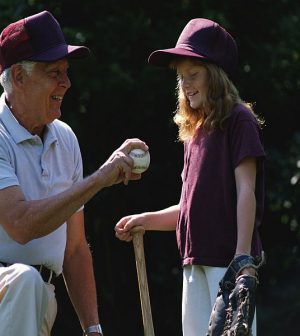- Could Your Grocery Store Meat Be Causing Recurring UTIs?
- Are You Making This Expensive Thermostat Error This Winter?
- Recognizing the Signs of Hypothyroidism
- 10 Strategies to Overcome Insomnia
- Could Artificial Sweeteners Be Aging the Brain Faster?
- Techniques for Soothing Your Nervous System
- Does the Water in Your House Smell Funny? Here’s Why
- Can a Daily Dose of Apple Cider Vinegar Actually Aid Weight Loss?
- 6 Health Beverages That Can Actually Spike Your Blood Sugar
- Treatment Options for Social Anxiety Disorder
Team Sports for Kids: A Winning Combo

Team sports are a great way for kids to get exercise, make friends and have fun.
Being part of a team also can instill important life lessons that will carry into adulthood as kids learn how to work with others and overcome obstacles, according to the Foundation for Global Sports Development.
Good teams offer determination and focus and inspire both in their members. Kids learn that every team and everyone can fail at times — as well as how to get up and try again. Playing team sports should teach youngsters how to play fair, be a good winner, be humble, and show good sportsmanship.
Being on a team also gives kids a chance to develop physical skills, improve against their own performance, and build self-esteem.
But it’s important for parents to be aware of the downsides, too.
Team sports can be stressful and competitive, with a “win-at-all-costs” attitude. Coaches may put too much focus on developing technical skills early on, which can lead to burnout. Or focus too much on a few skilled players, leaving others on the bench.
As a parent, you have a role to play in helping your child maximize the benefits of team sports, according to the American Academy of Child & Adolescent Psychiatry. Offer support and encouragement for his or her efforts, make sure to get to as many games as you can, and cheer from the sidelines without overstepping parent boundaries.
Also, have realistic expectations for your child. That means helping him or her handle a loss, not berating them for it, to ensure that sports provide a positive experience.
When kids are on the right team, they’ll feel happy and passionate about what they’re doing, and want to stay involved and build their skills.
More information
Check out the Foundation for Global Sports Development for details on the health, social and emotional benefits of school-based sports for kids of all ages.
Source: HealthDay
Copyright © 2026 HealthDay. All rights reserved.










